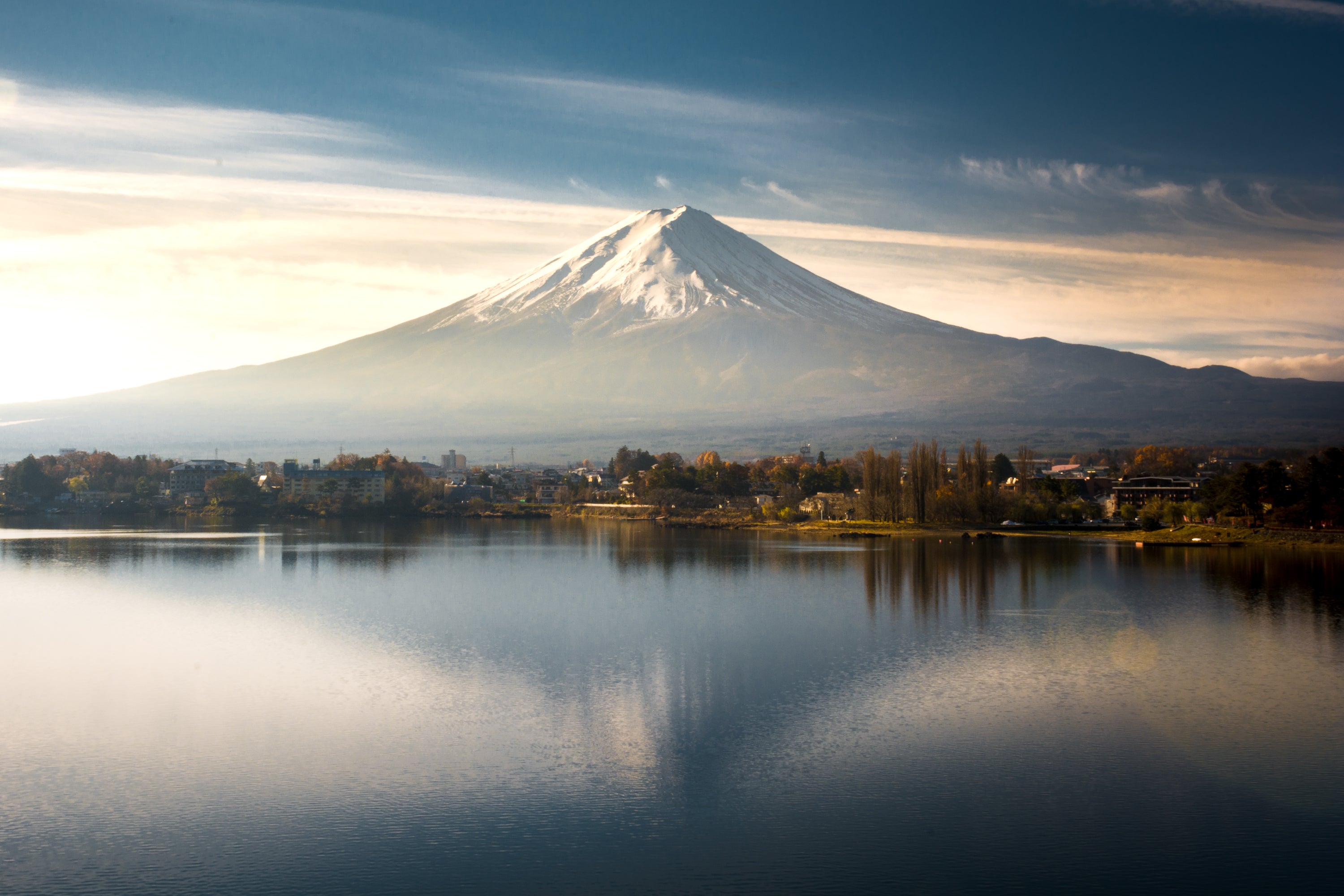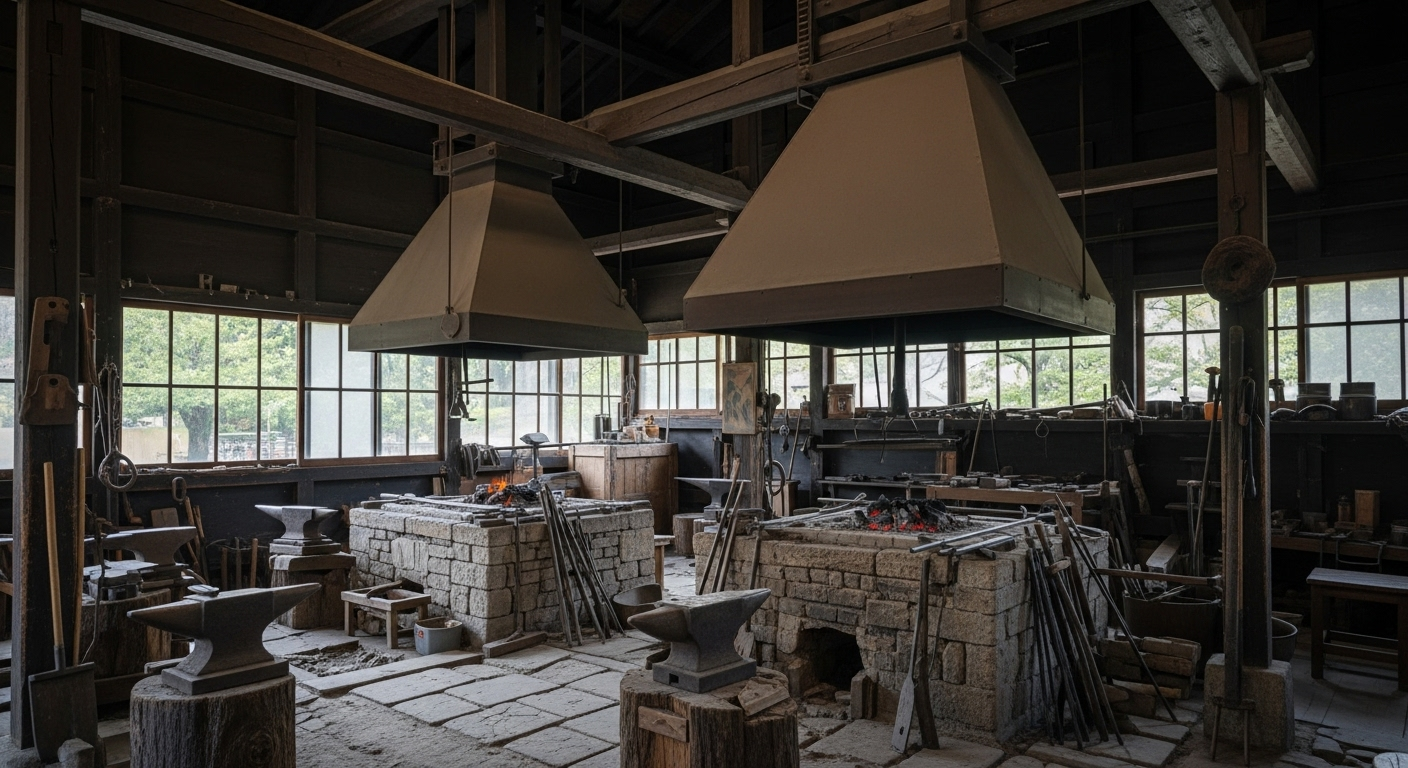
Les artisans traditionnels de Sakai — Préserver l'âme de la coutellerie japonaise
-
-
Les Gardiens de la Lame — Les Artisans Traditionnels de Sakai
À Sakai, au Japon, une poignée de maîtres artisans portent le poids de plus de 600 ans de tradition coutelière. Reconnus par le gouvernement japonais comme artisans traditionnels , ils consacrent leur vie à préserver des techniques ancestrales tout en privilégiant l'innovation pour l'avenir. Voici l'histoire de leur savoir-faire, de leur esprit et de la communauté qui perpétue ce trésor culturel.
Qu'est-ce qu'un artisan traditionnel ? — Le plus haut niveau de compétence reconnu par la nation
-

Au Japon, certains savoir-faire se transmettent depuis des siècles et sont appelés « artisanats traditionnels ». Ceux qui perpétuent ces traditions sont bien plus que de simples artisans : ce sont des « artisans traditionnels », officiellement certifiés par le gouvernement japonais pour leur savoir-faire exceptionnel. À Sakai, ville réputée pour ses couteaux de cuisine, seuls quelques artisans triés sur le volet obtiennent ce titre prestigieux.
Pour être certifié artisan traditionnel, il faut répondre à des normes extrêmement élevées :
-
-
Plus de 12 ans d'expérience pratique
Les artisans doivent consacrer plus de 12 ans à la maîtrise des techniques complexes impliquées dans la production d’objets d’artisanat traditionnels désignés par le gouvernement. - Des tests de compétences rigoureux
Ils doivent réussir des examens écrits et pratiques pour prouver objectivement leur savoir-faire. - Un lien profond avec la tradition locale
Dans la plupart des cas, les artisans doivent vivre et travailler dans la région où leur artisanat est né, garantissant ainsi que leurs compétences sont façonnées par la culture et l’histoire locales.
-
Plus de 12 ans d'expérience pratique
-
-

Seulement 28 artisans — rares gardiens d'un trésor national
En mai 2024, seuls 28 artisans traditionnels de Sakai étaient spécialisés dans la fabrication de couteaux japonais. Ce chiffre en dit long sur la rareté et la valeur inestimable de leur savoir-faire. Ces artisans sont le fondement invisible de la réputation mondiale des couteaux Sakai.
-
Le chemin vers la maîtrise — Plus de 10 ans d'entraînement acharné
Devenir un artisan traditionnel n’est pas un travail, c’est un engagement à vie envers la maîtrise.
-

-
Plus de 12 ans d'apprentissage rigoureux
Leur voyage commence par les techniques les plus fondamentales et évolue au fil des années d’essais, d’erreurs et de pratique acharnée – un chemin qui exige au moins 12 ans de dévouement sans faille. - Examens de certification exceptionnellement difficiles
Les connaissances techniques et les compétences pratiques sont toutes deux évaluées. Le taux de réussite est très faible. - Un raffinement tout au long de la vie
Même après leur certification, les artisans doivent continuellement évoluer et perfectionner leurs compétences. La complaisance n'a pas sa place dans ce monde.
-
Plus de 12 ans d'apprentissage rigoureux
-
Plus que des artisans, ils sont des gardiens et des innovateurs
Les artisans traditionnels ne se contentent pas de préserver le passé : ils font le lien entre tradition et innovation. Leur rôle est essentiel :
- Techniques de transmission
Ils encadrent les jeunes artisans et veillent à ce que les savoir-faire anciens perdurent. - Maintenir la qualité
Leurs normes sans compromis sont ce qui fait que les couteaux Sakai sont reconnus par les chefs du monde entier. - Stimuler l'innovation
Ils adoptent de nouveaux matériaux et de nouvelles idées tout en respectant les méthodes ancestrales.
- Techniques de transmission
-

Défis pour l'avenir — Ce qui doit être protégé
Malgré leur importance, les artisans traditionnels de Sakai sont confrontés à de sérieux défis :
- Un nombre décroissant de successeurs
De moins en moins de jeunes choisissent cette voie exigeante, mettant en péril la transmission des compétences. - L'évolution des marchés mondiaux
La concurrence internationale croissante exige que les artisans maintiennent la qualité tout en restant durables. - Nécessité de meilleurs systèmes éducatifs
Les compétences autrefois transmises par l’intuition et l’observation doivent désormais être préservées grâce à des programmes de formation formels.
- Un nombre décroissant de successeurs
-

En fin de compte, ce que nous protégeons, ce ne sont pas seulement des outils, c'est l'esprit
Les couteaux fabriqués par les artisans traditionnels de Sakai sont bien plus que de simples outils culinaires. Ils reflètent le respect de la nourriture, le souci du détail et l'esprit artisanal.
Pour honorer cet esprit, nous devons reconnaître, soutenir et partager ces valeurs avec les générations futures.
Grâce à ces artisans, les couteaux Sakai continuent de gagner l'amour et la confiance des chefs du monde entier. Si nous voulons que ces trésors survivent encore cent ans, il est de notre devoir de protéger les mains qui les fabriquent.

L'origine de l'artisanat
-
Colonne
Les couteaux japonais de la ville de Sakai ne sont pas de simples outils ; ce sont des chefs-d'œuvre artistiques incarnant 600 ans de tradition.
-
Les couteaux japonais Sakai sont bien plus que de simples ustensiles. Ce sont des œuvres d'art imprégnées du savoir-faire et de l'esprit d'artisans qui ont perfectionné leurs techniques pendant six siècles. Chaque lame renferme la sagesse, l'ingéniosité et les efforts incessants d'innombrables générations . Chaque fois que je tiens l'un de ces couteaux, je ressens la profonde responsabilité de transmettre cette tradition à la génération suivante. Je veux que ceux qui utilisent ces couteaux ressentent non seulement la prise en main et le tranchant dans leurs mains, mais aussi la riche histoire gravée dans chaque coupe. C'est ce qui rend les couteaux japonais Sakai vraiment exceptionnels .

Découvrez la netteté à laquelle font confiance 98 % des meilleurs chefs japonais — fabriquée à la main dans la ville de Sakai.
Grâce à notre partenariat exclusif avec l'atelier de couteaux Shiroyama, nous livrons des couteaux Sakai exceptionnels dans le monde entier. Chaque couteau est livré avec un affûtage Honbazuke gratuit et un saya en magnolia fabriqué à la main, ainsi qu'un service après-vente en option pour une confiance durable.
Les trois promesses de KIREAJI
-

1. Forgé dans l'héritage de Sakai
Originaire de Sakai, berceau japonais des couteaux de cuisine professionnels, chaque lame est fabriquée par des maîtres artisans forts de plus de six siècles de tradition. Parfaitement équilibrée, durablement tranchante et d'une finition exquise, chaque coupe incarne l'essence même du savoir-faire artisanal.
-

2. Un soin attentionné pour une utilisation quotidienne
Chaque couteau est livré avec un saya en magnolia monté à la main pour un rangement sécurisé. Sur demande, nous offrons un affûtage final Honbazuke gratuit, pour un tranchant précis et prêt à l'emploi dès le premier jour.
-

3. Un partenariat pour la vie
Un couteau KIREAJI est plus qu'un outil : c'est un compagnon de vie. Grâce à nos services d'entretien sur mesure et payants, nous préservons son tranchant et sa beauté, garantissant qu'il reste aussi précis et fiable qu'au premier jour.








